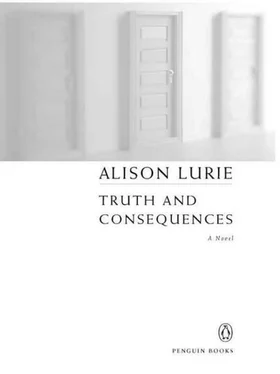“Mrs. Mackenzie?” he said. “I’m Henry Hull.”
“Oh, good.” She smiled back “You’ve come about the ceiling.”
“The ceiling?” He gazed vaguely upward.
“Not here, in the kitchen. Come on, I’ll show you.” She headed for the back hall, thinking that as a rule the guys from B and G were much better looking than the average professor. “There.”
“Wow. It looks like a big piece of plaster has come down,” he said.
“Yes.” Clearly, though attractive, he was a little slow on the uptake. “So what do you think?”
“It doesn’t seem too bad. I guess you should call Buildings and Grounds, or whatever.”
“But you are Buildings and Grounds,” Jane said, her voice fading from irritation to uncertainty.
“No. I’m Henry Hull,” he repeated. This time, a vague feeling of having heard the name somewhere came over Jane.
“Delia Delaney’s husband.”
“Oh. I’m sorry. I didn’t remember.”
“That’s all right. Nobody does.” He smiled very slightly.
I suppose not, Jane thought, and for the first time she considered that it might not always be wonderful to be married to a famous person. She tried to remember what she knew about Delia Delaney’s husband—not much compared to the masses of information the Center had received on his wife. All she could recall was that he was an editor at a small publishing company, but worked mostly at home.
“Well, how do you do?” Embarrassed, but determined to be polite, she held out her hand. After a second of hesitation, Henry took it; his grip was warm and hard, like that of the Buildings and Grounds employee she had believed him to be. “So how is everything going? Are you comfortable in the Vogelmans’ house?” One of Jane’s regular jobs at the Center was to find sabbatical rentals for the Visiting Fellows.
“Oh, very. Nothing but comfortable.” Henry Hull smiled ambiguously. “You’ve seen it?”
“Oh yes.” The Vogelmans’ house was one of the largest on the hill; it was totally modern, with four bedrooms, three baths, a two-car garage, a large deck, and central air-conditioning. Since Henry did not comment further but only smiled, she added, “Is something wrong?”
“Not essentially. But it’s a bit disconcerting, don’t you think, all those dead gray and brown birds?”
It was true, Jane remembered, that in the dining room and study of the house there were a number of cases containing stuffed birds. “Professor Vogelman and his wife are ornithologists,” she said.
“Yeah, I know.”
“I think they’ve actually discovered a new species, or maybe it’s what’s called a variant.”
“But they look so unhappy—the birds, I mean. They sit in their glass cases, on their brown and gray twigs, and look at you while you eat dinner. Some seem angry, but most are just miserable.”
In spite of herself, Jane giggled. “I know what you mean,” she said. “I wouldn’t really want them in my house. But maybe you could move the cases,” she said.
“Not a hope. They’re built into the walls. I looked.”
“Or put something over them?”
“But we’d know the birds were still there, underneath.”
“You’d forget after a while.”
“Maybe.” He looked grave: for a moment she wondered if perhaps the whole thing wasn’t a joke. “I’d forget, but Delia wouldn’t. No, the only solution is never to use the dining room.”
“Or the study.”
“That’s all right. I’ll be working in the study: I can get along with the birds.”
Jane returned his smile. Her wish to leave for home had wholly vanished. “Would you like a cup of tea?”
“No thanks. I’ve really just come to look at the office for Delia.”
Jane, who knew that the upstairs wouldn’t be cleaned until tomorrow, would normally have said that the Center wasn’t open yet. But now she hesitated, not wanting to seem rude or unfriendly. “Couldn’t she come herself?”
“No, she has a migraine. Is the office upstairs?”
Already he was moving toward the hall. Jane reluctantly followed.
“This won’t take much time,” Henry assured her, beginning to ascend the wide red-carpeted staircase two steps at a time. Though his build was solid, he seemed agile.
“If you’ll show me. . . . This one?” He walked into the former master bedroom, which had a bay window with views to the south and west. “It’s a good big space,” he said thoughtfully “She’ll like that.”
“I hope so.” Jane spoke with confidence: all the past Fellows to whom she had assigned this office had been appreciative and grateful.
“It’s very bright,” he added after a moment.
“Yes, you get wonderful light here. Even in the winter.” She paused, registering something negative in his intonation. “You mean it’s too bright for you?”
“Not for me, but maybe for Delia.” He smiled almost conspiratorially, and Jane smiled back. “Bright light sometimes brings on one of her attacks.”
“There are blinds,” Jane said. “And drapes she can pull.” Going to one of the west-facing windows, through which the August sun poured like thick, hot honey, she demonstrated.
“Yes, that might help.” Henry made a note on his clipboard; then he began to circle the room, opening the drawers of the big leather-topped oak desk, trying out the desk chair and the easy chair by the bay window, lifting the phone, and turning the desk lamp off and on. “There’s a connection to the University computer system?”
“Oh yes, right here.”
He leaned and peered behind the desk, as if he did not quite believe her.
“That’s good. And do you have a surge protector?”
“She won’t need one. We’re already wired for power outages, it was in the brochure we sent you,” Jane said, beginning to feel impatient.
“Great.” Henry smiled at Jane again, but this time with less effect. “I think we may have to move the desk,” he said. “Delia works best when she has a view.”
You may have to move the desk, not me, Jane thought but did not say.
“Well, it’s a pretty good space,” he said. “I think she could be happy here. But she’ll need a sofa.”
“A sofa?” Jane said, not encouragingly.
“Yeah, you see, when a migraine’s coming on Delia mostly gets an aura. Then if she can take her pill and lie down in a darkened room, sometimes that will head it off.”
“Does she get migraines often?” As far as Jane could recall, nothing in any of Delia Delaney’s glowing, even fulsome letters of recommendation had mentioned this.
“It varies,” Henry said vaguely. He ran a hand along the pink marble mantel, over which hung a large antique sepia photograph of the University quadrangle, glanced at the dust that had collected on his fingers because the rooms hadn’t been cleaned for a month, but made no comment.
Jane sighed almost audibly. Very possibly, Delia Delaney was going to be this year’s problem Fellow. “And how long do her migraines last?”
“Oh, that varies too. Sometimes only a few hours, sometimes up to two days.”
“That’s too bad,” Jane said. “I hope she won’t have them on Tuesdays and Thursdays.” In exchange for a generous salary, free secretarial service, free campus parking, and what most of them considered luxury accommodations, all the Fellows were expected to hold office hours and make themselves available to students and faculty with a special interest in their subject. They were also expected to attend the two public lectures or readings each of them would give, and the informal weekly lunches to which selected members of the faculty would be invited.
“Unfortunately, they’re not scheduled in advance.” Henry sat casually on the edge of the leather-topped oak desk, which had once belonged to Matthew Unger himself. “I’m sure she’ll come in when she can.”
Читать дальше







![Кэмерон Доки - Правда и ее последствия[Truth and Consequences]](/books/79610/kemeron-doki-pravda-i-ee-posledstviya-truth-and-con-thumb.webp)




